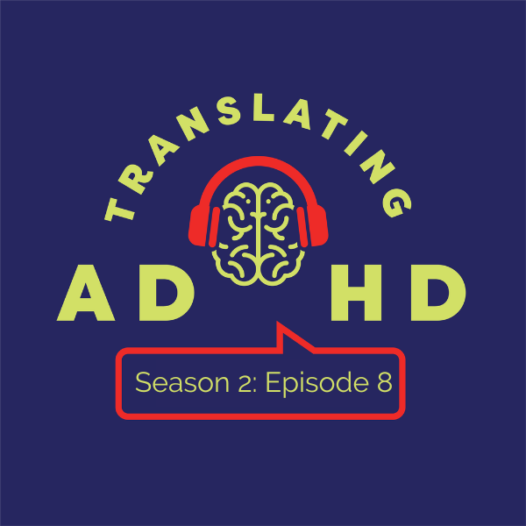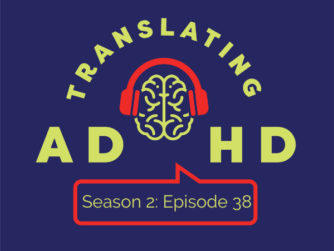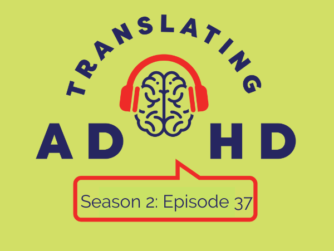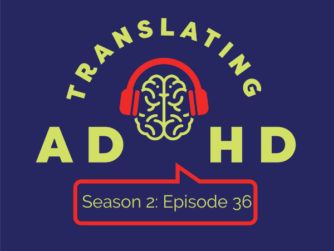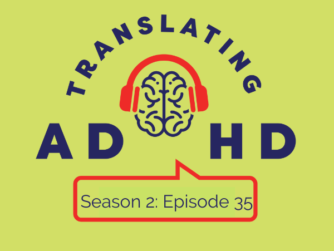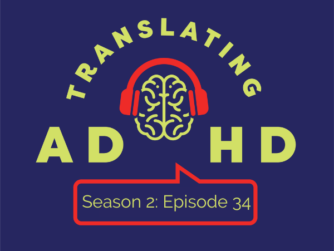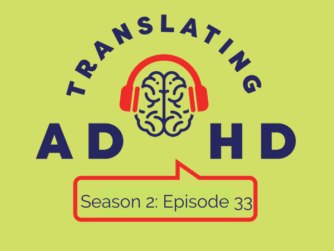In this episode of Translating ADHD, Ash and Cam return to awareness, the first barrier of ADHD, and share a few examples of “You know you are here if..” They explore client scenarios that are a good indication of being stuck at the first barrier. Being at the first barrier is often exemplified by having some sense of a challenge but also not seeing all of the picture. ADHD makes it difficult to get to causation and nowhere is this more evident than the first barrier characterized by the first stage of change, pre-contemplation or “you don’t know what you don’t know”.
There are many examples, but Cam and Ash share three in particular – where individuals coming to coaching may think they need only tactical support, view ADHD as a superpower, or perceive it as a curse. The hosts discuss each example and first steps to moving through the barrier to new awareness. The hosts not only emphasize the importance of gaining awareness, but also recognizing self-criticism and seeking support to navigate these challenges.
Episode links + resources:
For more of the Translating ADHD podcast:
- Episode Transcripts: visit TranslatingADHD.com and click on the episode
- Follow us on Twitter: @TranslatingADHD
- Visit the Website: TranslatingADHD.com
Episode Transcript:
[00:00:00] Ash: Hi, I’m Ash. [00:00:00] Cam: And I’m Cam. [00:00:01] Ash: And this is Translating ADHD. Cam, I’m stoked about what you’ve brought for today’s episode. So why don’t you kick us off and tell our listeners what it is we’re going to be talking about? [00:00:14] Cam: I’m happy too, Ash. And this is one of those weeks where I’m seeing you on a Tuesday. [00:00:20] Ash: You are. [00:00:22] Cam: Nice to see you again. And I saw you on Monday, and it’s occasionally what happens is we get going, we kind of find our way down a corridor, and it’s like, Oh, you know what? This isn’t working. And so we haven’t had that happen in a while, but it happens. I don’t know, maybe once every 15 times it’s like, okay, let’s just do a do-over – what time are you available? [00:00:44] Ash: And Cam, what I’m appreciating about that and the growth in our process is that we stopped and I said, I’m not feeling it. And you said me either. And that was that. We picked a time, we’re here on a Tuesday, and it wasn’t always that easy. We’re benefiting from our practice here. [00:01:03] Cam: Yeah, and building our awareness, right. Which brings us to the topic today around when do you know you’re camping out at the awareness barrier. So we’ve been talking about the three barriers of ADHD and how they correlate or match up with the three phases of coaching, right? Awareness, action, learning – coaching as an awareness, action, learning model.Challenges that we have with ADHD are in those three areas. So you’re like, well, wait, isn’t that a problem? No, it’s an opportunity. It’s an opportunity to work with your coach to address each barrier. And everyone kind of shows up typically at the awareness barrier. Right. But they also might be thinking that they’re at the action barrier. I procrastinate. I have such a hard time doing what I know I ought to do. So they’re thinking they’re at that action barrier. And that’s where I got to put all my focus. We’re going to suggest that you are probably stuck at all three and to kind of look at what is the opportunity and the work that is available at all three.
So what Ash and I thought we’d do today is kind of talk about, like, so a couple of different scenarios of like, how do you know you’re camping out at the base of the awareness barrier? So we’ll kind of go through these. And we just sort of thought of a couple. There’s probably more, but the ones that we could think of were these. So should I roll them off all five and then we’ll hit them or should we do one at a time, Ash? What do you think?
[00:02:43] Ash: Let’s do one at a time because my brain’s ability to retain five things at once, and then talk about all five, is probably not the best. I do have ADHD, Cam. [00:02:56] Cam: So the one that I hear a lot, and it’s again, often I see in a coaching inquiry, is this sort of, okay, I know what I need. I need some tactical support. I need some tools to address my ADHD, to do what I need to do, to address follow through. And again, back to that universal question of doing what I know I ought to do. But this idea of, all I need is some tactical, strategic, your system, you’ve got it and give it to me, and I’ll be on my way. So that’s the first one. [00:03:37] Ash: And this is the story of a person with ADHD who doesn’t know they have ADHD – is the search for the right system, the right tool. When my clients come to this place, I like to talk about the phrase, if you could just. Our whole lives as ADHD people, people have been telling us, if we could just… Write it down. Start sooner. Plan better. Leave on time. I could go on for the rest of this episode with examples if you could just.Yet we can’t just. So, right here, we’re talking about symptom versus cause. Tips, tricks, tools, hacks, they look at a symptom – procrastination – and say, okay, you procrastinate, do this, but it doesn’t get to cause. And we’ve talked a lot on this podcast about how causation is unique for each of our clients.
[00:04:43] Cam: Oh, that’s my cue. [00:04:45] Ash: That’s your cue. I think we should leave that in. And if y’all, if I could just describe the surprised Pikachu face Cam gave me, [00:04:57] Cam: That was not surprised. That was just delight. It was just pure delight. Um, yeah. [00:05:01] Ash: That looked like a surprise. [00:05:03] Cam: Okay, all right. I’ll give you that. So part of this dilemma of being at the barrier of awareness is not having all the data that you’re not fully aware of what’s going on. And there are a couple of things here.Number one, I think first and foremost is we don’t know the true impact of ADHD. You’re out there, and you’re looking at what it is, and it’s all focused on the symptoms, okay, right. Of people saying, well, you are distracted, and this is what you need to do. You do procrastinate, and this is what you need to do. You are emotionally dysregulated, and this is what you need to do.
So this sort of plug-and-play is very much of a system strategy approach. And ADHD goes much deeper than that. And having ADHD makes it very difficult to get to causation. And if you want to go back and listen to our first four years, that’s what we’ve been talking about.
And so that first one. Again, this idea of tactical support. I enjoy what you just said about like, you know if that was the case, and it’s like, it doesn’t work, right? What’s your experience there? What is your experience there, listener, that a system or a tool works for a little bit and then it runs its course?
And so, then it comes back to, again, there’s another system, and it runs its course. So this isn’t to overwhelm you or to think, to say that it’s a losing battle. It’s more nuanced than this. And to kind of discover how ADHD shows up for you uniquely.
[00:06:40] Ash: Cam, I’ll just toss in that this very thing is why I’m an ADHD coach and not a professional organizer. My favorite clients when I was organizing were always neurodivergent clients. They were also the ones that had the least amount of success in terms of what they wanted out of our organizing work and what we were able to achieve.Organizing does take that systems-based approach, and that’s the approach that I knew how to take at the time with my clients. So I intended to add coaching to my organizing practice. That’s not what happened, because I enjoy working with ADHD people, and I believe that organizing or disorganization is a symptom, not a cause, and I want to work on the cause. So what’s number two?
[00:07:34] Cam: Number two would be, this is always funny, it’s sort of like there’s a deal, like we’re making a deal here. And it’s like, you got something for me, and I need more of it. Right. So, this discovery of the superpower. This is a superpower, and you’ve got the key. You’ve got the Da Vinci code that unlocks this amazing power, right? So it’s a superpower. I experienced hyperfocus, and you’ve got the roadmap for me to access hyperfocus all the time. [00:08:10] Ash: Yeah. That one always makes me laugh. And the place I like to go with clients to get them a little curious about hyperfocus is to talk a little bit about hyperfocus and what are the downsides because the client remembers that’s how I get things done. That’s when I’m at my best. That’s when I light up.What they discount or don’t remember is throwing self-care out the window, not taking care of basic needs, and tuning out other things or people that deeply matter to them. And the big one, the ARC crash, the crash at the end of the Adrenaline Response Cycle.
And so I don’t tell a client this outright. I just ask them, Okay, you want more hyperfocus. Let’s talk about what hyperfocus looks like.
[00:09:04] Cam: Yeah. And each of these, again – I appreciate what you’re focusing on in the sense of what we do in coaching – is around, so what is your experience here? What’s your experience about, again, those tools and tactics? Do they work?In this invitation, there might be more to look at here, and there might be more to look at here again. And as you said, it’s sort of, let’s look at the other side of that ARC cycle of the crash and the recovery.
[00:09:32] Ash: And Cam, over time, inviting the client to consider that there might be another way. And that’s the thing that our clients don’t know because all they do know is hyperfocus works, pressure works, urgency works.I’ve had several clients over the years who have asked me in one way or another as part of our coaching if I would help hold their feet to the fire. And my response to that is, if there’s no real deadline, will that even work? And then they get this crestfallen look, and they say no every time. Right? Because, let’s face it, as ADHD people, if we could manufacture urgency, that’s what most of us would be doing, whether it’s healthy or not.
[00:10:26] Cam: So the thing that we’re going to do is we’re not going to take away that ability to hyperfocus, right? It’s like, well, that sounds boring, Cam and Ash. You’re going to take away my superpower. No, we’re going to help you modify it, right? That brings on other ways to engage with your stuff so that you’re not just solely reliant on hyperfocus, right? So this is about the flow state, which is a healthier cousin of hyperfocus. [00:10:58] Ash: I think it’s also about recognizing when hyperfocus can take a nasty turn. When it goes from doing good productive work, to not doing good productive work, to spinning your wheels and not attending to other needs.I had a relevant client session right before we hopped on to record today with a client who’s a professor. It’s the end of semester time. It’s crunch time. And there’s nothing. What we can do about the fact that it’s crunch time, it’s kind of the nature of the beast. But what our conversation was around was how can I minimize the stress so that I don’t crash in the middle of this or at the end of this.
And it was very little stuff like setting a couple of phone alarms to check in with herself in the middle of the day. What does my body need? Do I need food? Do I need water? Do I need a bathroom break? Should I take a walk and hit reset? Am I kind of in that space where I’m spinning and I’m frustrated and a bit of a break and a context change would help?
And then the second part of our conversation was about protecting sleep. Here’s the cool thing, is as my client has developed awareness throughout the rest of the semester that we’ve been working together, she was instantly able to recognize the impacts of short-cutting her sleep, short-cutting her movement, and not taking care of basic needs. Things that she wouldn’t have been aware of at the end of the previous semester.
So she came with her attention towards, here’s what I can’t do, is I can’t make it not crunch time, but what can I do? And here’s what I know is important to protect, because it’s going to pay more dividends than the time it takes. Meaning that story I tell myself in the moment that I don’t have time, or I have to stay up late, I just have to keep grinding, isn’t real. And a break is going to serve me better. Getting enough sleep is going to serve me better.
[00:13:13] Cam: That’s a great example. And to kind of look at, again, why we are at this awareness barrier, right, is that there’s new awareness on the other side. That something is missing. There is a blind spot, right? We’re not seeing all the options. This is why this awareness work is so important to get better access to what is available.And that’s where I think then we start to access the real superpowers of our clients. Right. With this visibility and seeing all the options, we can get more curious creative, and strategic. The blind spot that I see with the person seeking hyperfocus 24/7 is gonna put this out to some of the bros out there.
So you’ll see these guys on TikTok, Instagram, dopamine state bros, which is sort of like, it’s a superpower. You just need to harness it. And your thinking is that everyone around you loves it and loves you for it. And I’m going to say, I don’t think so. Sorry. It’s like, you think it’s cool. Maybe there are people around you who think it’s cool, but there are people in your life who are a little wary, tired, and fatigued of that state.
And so, again, that constant up and hyped and go, go, go wears on your closest relations. And I see this in my relationship class that I teach, where people are there because they have to improve their relationship. They want to improve their relationship. And yet, there’s a couple in there be like, Yeah, I just wish my spouse knew that this is just a superpower. And if only they knew this, everything would be cool.
It’s like, there’s some awareness on the other side of that barrier that is available here. What you think is not necessarily what others are thinking. So to kind of, again, find out, Hey, how is my experience of being this way? How does that impact you? Right. To develop some empathy and appreciation of how others might be seeing the situation. Oh, by the way, ADHD makes it hard for us to do that, to appreciate someone else’s view.
[00:15:40] Ash: Cam, I had a client that had great language around this, and I’ve shared this on this show before, but I think it’s worth sharing again. She was in grad school, and from her perspective, everything was going well. She showed up to a meeting with fellow students, one of whom dressed her down in a very, I don’t know what word I’m looking for. Like, it was rude. It was, like, in a pretty harsh manner about her ADHD and the impact that it was having. And she described that moment as the fantasy bubble bursting. And I think that’s something that a lot of us with ADHD can identify with. That moment where you’re like, oh, okay, now I understand that the impact is more serious than I thought, but I don’t know what to do with that.Also, I think if you’re going to talk about the dopamine bros, you also have to talk about the other side, right? People who think ADHD is just an utter curse. And they’re hoping by coming to coaching, we can work some magic and lift the curse.
[00:16:52] Cam: Right. An exorcism. You’re going to perform an exorcism. Is that right? Yeah. Yeah. Yeah.But it’s, again, that we’re sharing a few of these examples, right? There’s the first, it’s sort of the, you’ve got tactics, you got some system you’re going to give me, right? There’s that destination thinking. This is a superpower, and you’re going to help me harness this superpower.
There’s also this is a curse. And we don’t mean to make light of that. We are well aware of growing up and living, especially with a late diagnosis. Being misunderstood. I just got off the phone with a group all in their fifties, all with late ADHD diagnoses, going through their lives, not understanding themselves, not having others understand them.
So it’s understandable if you come and see this as this is a thing, it’s terrible. I have suffered so greatly from the ADHD tax. And again, how do we remove it? How do we move away from this thing? Make it go away. So there are these predominant mindsets that are in play, right?
There’s an easy fix I just need to get, you know, the superpower of it, or it’s all bad. And you’re going to work your magic, coach, versus we partner and we explore. And there is more to it than the way that the individual is looking at it. This is part of our talk at the annual international conference where we talk about curiosity, nuance, and distinction. There’s more to it than how you’re experiencing it in this current moment.
[00:18:50] Ash: There’s more to it, and your context matters. It matters so much. I think the last couple of interviews we did, Cam, for our ADHD Person of Color series that we were doing is a great example of how much context matters. I still think about Sudhita talking about model minority and how being South Asian with ADHD breaks that mold of what people expect from her just by looking at her. That’s her context.And things like that come up with my clients all of the time. Your upbringing, who you are, it all is in the mix and has an impact. I say this so often, but it’s always worth repeating: ADHD coaching and whole-person coaching, if it’s a Venn Diagram, it’s just a circle. Because ADHD has an impact, and your context matters. The context in which it’s having an impact matters.
[00:20:09] Cam: That’s a great point. The thing as we finish up today, we know it’s, you might be sitting out there, listeners, and saying like, well, you didn’t describe my situation. And it’s like, you know, we didn’t cover them all. We wanted to share how we often meet individuals. They’ve come and they’ve realized, all right, I’m not able to address this on my own anymore. I know that ADHD is in play, and I need help. And that’s a great place to begin.Next week we’ll talk more about how we navigate these barriers, and with a capstone around getting to causation. The one thing I want to say, though, is that, and all three of these, something that I often see is that it takes a little time to get there.
But, again, back at this notion of, what’s the common theme of as you camp out at the base of the awareness barrier is that there’s something that’s impacting that you don’t have awareness of, right? This is getting to this place of understanding the need for change. What needs to happen?
Naturally, you don’t know this. This is very much of a human thing. There’ve been studies and studies about change models, and that before you can get to a place of contemplation, you’re at a place of pre-contemplation. You don’t know what you don’t know.
One thing that I do notice is this lack of awareness of the depth of self-criticism, right? In all three of those that we shared. And it might be more of the curse one than the other two, but without an understanding of what is going on, we fill in the blank. It doesn’t mean that you necessarily need a therapist. It is just thought that I came out of a class where there was awareness of, wow, I didn’t know how hard I was on myself. It was just this sort of automatic.
Again, this is a term, automatic negative thoughts. I didn’t know the extent of how tough I was on myself. They just took her, like my mom, and just kind of inserted her in my brain. Right. My mom was always questioning, challenging and judging. That is something to become aware of, is how do you treat yourself?
This is back to the four circuits of, again, our sense of who and sense of why. When we don’t have a good tether to our why, right, what are we doing, what matters, and who we are, then we start to question, judge, and criticize. And there’s no one there to stop us from doing that.
So listeners, if you are, again, find yourself being self-critical, give yourself a break. That’s the first step. And we do that in coaching is, okay, give that a break. There’s enough of that going on.
[00:23:13] Ash: And Cam, I’ll simply add to that. Try articulating it to somebody you trust. As coaches, one of the things that we do is reflect what our clients say. That moment of awareness with my clients most often comes when I reflect on their own words to them. And they can hear just how harsh it is.The other place that it happens so powerfully is in groups. There’s something about a group setting where people are just a little bit more aware of what it is that they’re saying as they’re saying it because there’s an extra layer of vulnerability there in what they’re saying.
So, try getting some of that stuff that’s swirling inside out. Out to somebody else, out to somebody you trust not to judge, so that you can look at it and examine it. That can be powerful. Cam, I think this is a good spot for us to wrap for today.
So a few weeks ago, Cam asked for one person to leave a review. Thank you, Machiavellian Princess, from Canada for leaving us a review. I’m going to go ahead and ask for one more if that’s okay. And so until next week, I’m Ash.
[00:24:36] Cam: And I’m Cam. [00:24:37] Ash: And this was the Translating ADHD Podcast. Thanks for listening.
